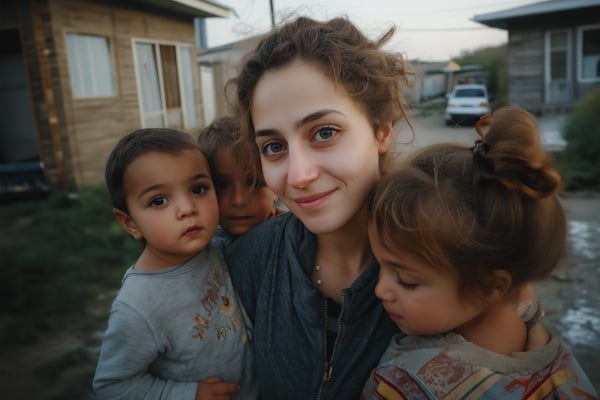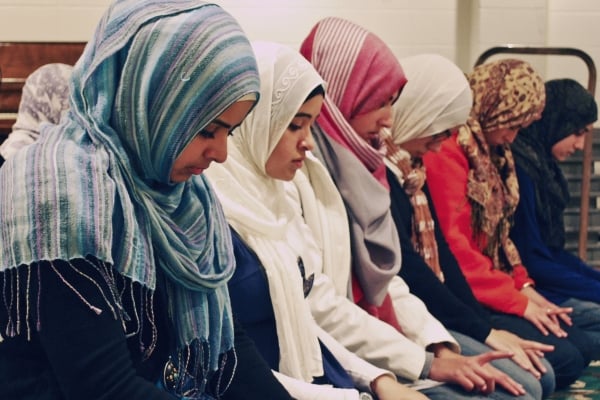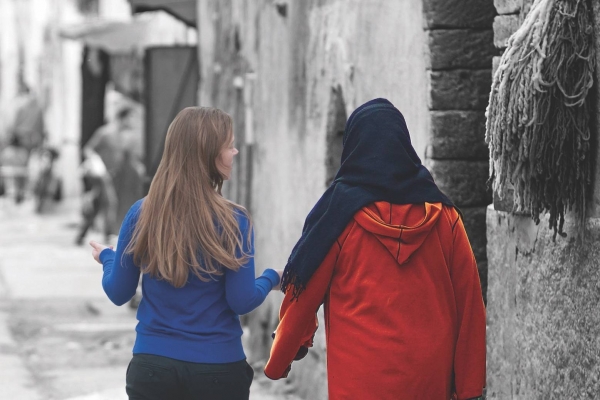
Let My Couch Be Offered: Sacrifices Pleasing to God
By Beverly Guy, Director of Communications, Christar U.S.
Saying “yes” to God can feel relatively easy when agreeing aligns with our vision for serving Him. But what about when the ask feels intrusive and inconvenient? What if it interferes with the plans we’ve prayed through and invades our personal space?
I was challenged to consider this recently as I listened to Hillary,* a Christar worker in the Middle East, share how God has worked through the simple yet deeply personal act of opening her living room.
“I have a tiny one-bedroom apartment,” she explained. “So, when people say, ‘Hey, can I stop by? Can I be on your couch?’ it's a test of if I want to be like Mary and Martha and say, ‘Welcome to my home, come in’ and sit with people and listen to them. And so, in this season, I'm trying to say, ‘Yes, God, I want to open my home. Yes, I have a couch to offer, but let it be offered.’”
This season has involved hosting and debriefing a young woman who’d been through deep loss, as well as welcoming her niece, who’s considering cross-cultural ministry. And it’s entailed walking alongside a young woman who was unaware of God’s love for her and of the hope found in Him.
Hillary had enrolled in a master’s degree program at a local university, and the day of her entrance exam, a fellow student, Elif, asked her a question: “Why are you in this country? We all want to leave.”
Hillary replied with the same answer she gives the taxi drivers who wonder why she’s there: “In America, I hang out with a friend I haven't seen in years, and I get 45 minutes for coffee with them. … Here, I can meet a stranger and sit for two hours.”
“You like coffee? I'll drink coffee with you,” Elif replied.
After the exam, they did just that. “Like I expected, we sat for two hours and talked and got to know each other,” Hillary recalls.
Of the 24 people who applied to the program, six were accepted. Both Hillary and Elif were among them.
But two weeks in the school year, Hillary found herself questioning, “What have I done? It's been 18 years since I’ve been in school. I'm dyslexic. School is hard. My books are scattered everywhere. My house hasn't been cleaned in a month.”
And then she received a message from a classmate: Elif had moved in with someone but needed to get out right away, and it could take a week or two for her to get into a dorm. “Could she stay with you?”
“I looked at my couch, and I looked at my house. I thought, ‘This is no, right?’ I'm stressed out.” But Hillary told God she wanted to be able to say yes, and in His grace, she did.
Elif arrived and the contents of her suitcases filled the living room. “There was no walking space,” Hillary recalls. But amid the chaos, “We had some amazing conversations. She said to me, ‘I don't know if God even loves me.’ … Of course she's referring to Allah. … I say, ‘The God I know, He loves you.’” Hillary then prayed for her as she wept.
It became increasingly clear that Elif’s presence in Hillary’s home wasn’t an accident. Time after time, whether through answering Elif’s questions about a painting on the wall or sharing a story about a stuffed animal, God enabled Hillary to communicate the hope she has in Christ. “Because this girl was in my house, we had so many opportunities that we wouldn't have had,” Hillary says. “I just kept sharing and sharing and sharing.”
When Hillary left for the States to attend her brother’s wedding, Elif was still staying on her couch. “I didn't know her that well. And I said, ‘All right, God, this house is yours. It's not mine anyway. So, take care of her. Take care of my house.’”
Months passed, and eventually Elif found other housing. But she struggled at work and became the subject of malicious rumors among her classmates. Convinced others were trying to destroy her, she’d hit bottom and couldn’t handle the stress. She contacted Hillary to tell her she was planning on writing a goodbye letter that night and jumping on the train tracks the next day.
In spite of Hillary’s efforts to talk her out of her plan, Elif was resolute. Grateful that she had the night to pray for Elif, Hillary lifted her up to the Lord.
In the morning, when Hillary reached out to her again, Elif was still determined to end her own life. Still praying, Hillary boarded a bus headed toward the train tracks.
On the way, Hillary’s phone rang. With relief, she heard Elif’s voice. She’d posted about her plans online, and someone had called the police, who had stopped her before she could step on the tracks. She was sitting with them and wanted to know: “Can you come and be with me?”
Hillary agreed, amazed that Elif would ask her out of all of the people in her life. She arrived, talked with the police and brought Elif home that night. And once again, she opened her couch.
Elif’s story isn’t finished, and Hillary doesn’t know how God will continue to use her willingness and compassion to draw Elif to Himself. And, though we’ve witnessed how the Lord often uses hospitality in the process of establishing churches among the least-reached, we’re still waiting to see what He’s doing in this community—a place where depression and suicidality are heartbreakingly common.
“When we open our home, when we open that couch, what kind of ministries does God give us?” Hillary asks. We don’t have the answer to that question when we say “yes.” We don’t know if it will completely disrupt our lives or if we’ll see how our obedience makes an impact. But we can be sure that it’s pleasing to God.
Hebrews 13:16 tells us, “Do not neglect to do good and to share what you have, for such sacrifices are pleasing to God.” (ESV) It’s easy to breeze over that verse—tucked into the end of a book dense with theology—as a postscript of sorts and miss the life-altering implications of following this command.
But, as these words make clear, sharing what we have is a sacrifice. It involves giving of our time and possessions—and sometimes our privacy—in ways that often result in us having less for ourselves. Our humanness tends to buck at the idea of ceding what’s “ours.” It can be uncomfortable, even painful, to relinquish what we think we’ve earned—I’m guessing that’s why the author of Hebrews found it necessary to tell us not to neglect sharing what we have.
But we’re not only given the command. We’re also given the assurance that our sacrifices—our willingness to endured intrusion and inconveniences—are pleasing to God.
And, even better, we’re reminded that we don’t sacrifice in our own strength. In the book’s benediction just a few verses later, we read:
Now may the God of peace who brought again from the dead our Lord Jesus, the great shepherd of the sheep, by the blood of the eternal covenant, equip you with everything good that you may do his will, working in us that which is pleasing in his sight, through Jesus Christ, to whom be glory forever and ever. Amen. (Hebrews 13:20–21 ESV, author’s emphasis)
We are equipped by the God who raised Jesus from the dead. He works in us so we can be pleasing in His sight as we do His will. And through Him we can say, “Here’s what I have. Let it be offered.”

















_1724957011_600x400.png)





_1654032461_600x400.jpg)









_1583365425_600x400.jpg)